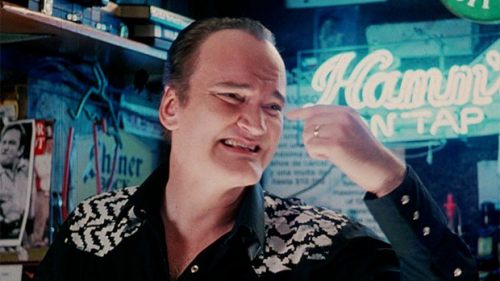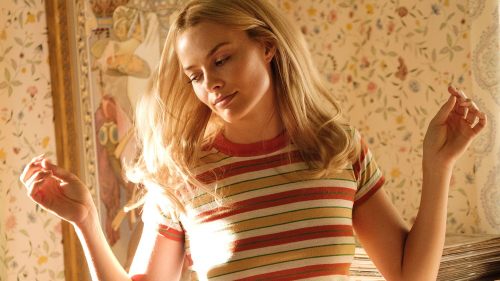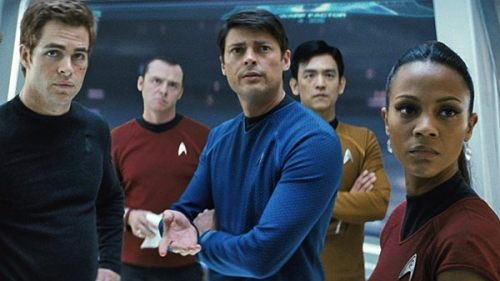PULP FICTION At 25: On Making Yourself And Surviving Being Unmade
Pulp Fiction is now a quarter of a century old, and it’s a fairly safe wager that it’s become immortal. Writer/director Quentin Tarantino’s breakout film is not merely widely acclaimed and beloved, it is iconic. So thoroughly has it permeated American popular culture that even folks who’ve never seen it can name its stars and quote its most famous lines. Individual moments – Jackson furiously quoting a fictional Bible passage and John Travolta perplexedly wandering around Uma Thurman’s luxurious home to name just two, have become memetic. They’ve taken on lives of their own, even as directly and indirectly they point back towards the picture from whence they first came. “Pulp Fiction” – the public consciousness’ ideas, memories and understandings of the movie, Tarantino and their legacies, exists simultaneously with Pulp Fiction – the actual movie. Given one of its major thematic interests, it makes a particular sort of sense that this has been the case. Pulp Fiction is, amongst many things, a study of self-perception. Of the ways in which people build artificial selves to make their way through the world. Of the difference between the image presented and the actual person. And of the inexorably intertwined vulnerability and strength that come with casting aside artifice and being one’s genuine self. It’s one of the most fascinating things about a continually fascinating film.
Almost everyone in Pulp Fiction wants to be seen a certain way. To attain that, they put on a show. Per Tarantino’s screenplay, during the dinner robbery that bookends the film, Tim Roth’s Pumpkin puts on the face of “the in-control professional.” His beloved, Amanda Plummer’s Honey Bunny, opts to play the psychopathic, hair-triggered, loose cannon.” Hitmen Jules Winnfield and Vincent Vega do something similar before invading the apartment of their targets – with Jules outright saying, “Let’s get into character.” When they break into the apartment, their victims don’t see two pals who had earlier chatted about the effects of the metric system on fast food hamburger names. Instead, they see two terrifying assassins – hardcore killers who’d blow them away as easily as they’d steal their lunch. Pumpkin, Honey Bunny, Jules and Vincent aim to make an impression. If they get it right, the image they project will not only give them sway over the room, it will become armor. After all, it’s scary to stand up to someone who, unprovoked, threatened to execute everyone in a restaurant should they move so much as a hair. And for those who live violent lives, any kind of safety is very much welcome.
Even the less brutal members of Pulp Fiction’s ensemble play parts, whether consciously or unconsciously. Christopher Walken’s Captain Koons doesn’t just give a young Butch Coolidge (Chandler Lindauer) his late father’s watch. He wears his officer’s uniform and tells the boy the watch’s entire history – from his great-grandfather down to him, in graphic detail. He wants Butch to understand that the watch is more than just a watch, and so makes himself and it as impressive as possible. As an adult, Butch (Bruce Willis) – now a boxer who’s just reneged on a deal with powerful crime lord Marsellus Wallace (Ving Rhames) – plays cool and easy going to a contact. Yes, Butch accidentally killed his opponent in the ring. Yes, Marsellus now wants him dead. He apologizes to his fallen foe Floyd in the relative privacy of a cab, and he’s honest with his girlfriend Fabienne (Maria de Medeiros) about how much danger their lives are in. But for his contact it’s, “Enough about the poor unfortunate Mr. Floyd, let’s talk about the rich and prosperous Mr. Butch.” He’s not regretful or terrified, he’s ready and raring to start his new life of leisure and luxury.
Pulp Fiction’s ensemble members build themselves up so that they might meet the world on their own terms. To a point, they succeed in doing so. But the world has ways of shattering even the mightiest façade. Whether through accident or crisis, many of Tarantino’s motley crew must face the world as themselves. It’s almost invariably terrifying for them, but it’s a crucible through which they have the opportunity to emerge with a better understanding of themselves and the world.
In facing down Jules, a man who is neither impressed nor intimidated by their hard-edged robber personas, Pumpkin and Honey Bunny reaffirm that they deeply and truly love one another. The cool-as-a-cucumber pro and the barely restrained axe murderer melt away to reveal two scared kids who are happier that their partner is alive than that they were allowed to get away with a considerable score. Even at their most terrified, they do their best to protect each other.
In confronting the reality that he has been a tool for evil and done evil himself, Jules faces the end of his life as he knows it and chooses to step forward. Whatever the miracle behind his and Vincent surviving a gun being emptied at them at point blank range, Jules cannot look away from the fact that living by the way of the gun is going to end in death. He does not want that. And so, even as the cluelessly wounded Vincent tramples their friendship (and nearly sabotages Jules’ attempt to talk down Pumpkin and Honey Bunny) Jules decides to try something new. It will not be easy. The defense mechanisms he had built into his previous persona – the bombast, the ruthlessness, the Ezekiel quote – will not be there to protect him. Jules closes out Pulp Fiction more emotionally open and vulnerable than he has been in perhaps years. But he is awake. And with that awakening, Jules is able to close out Pulp Fiction having found a new truth.



